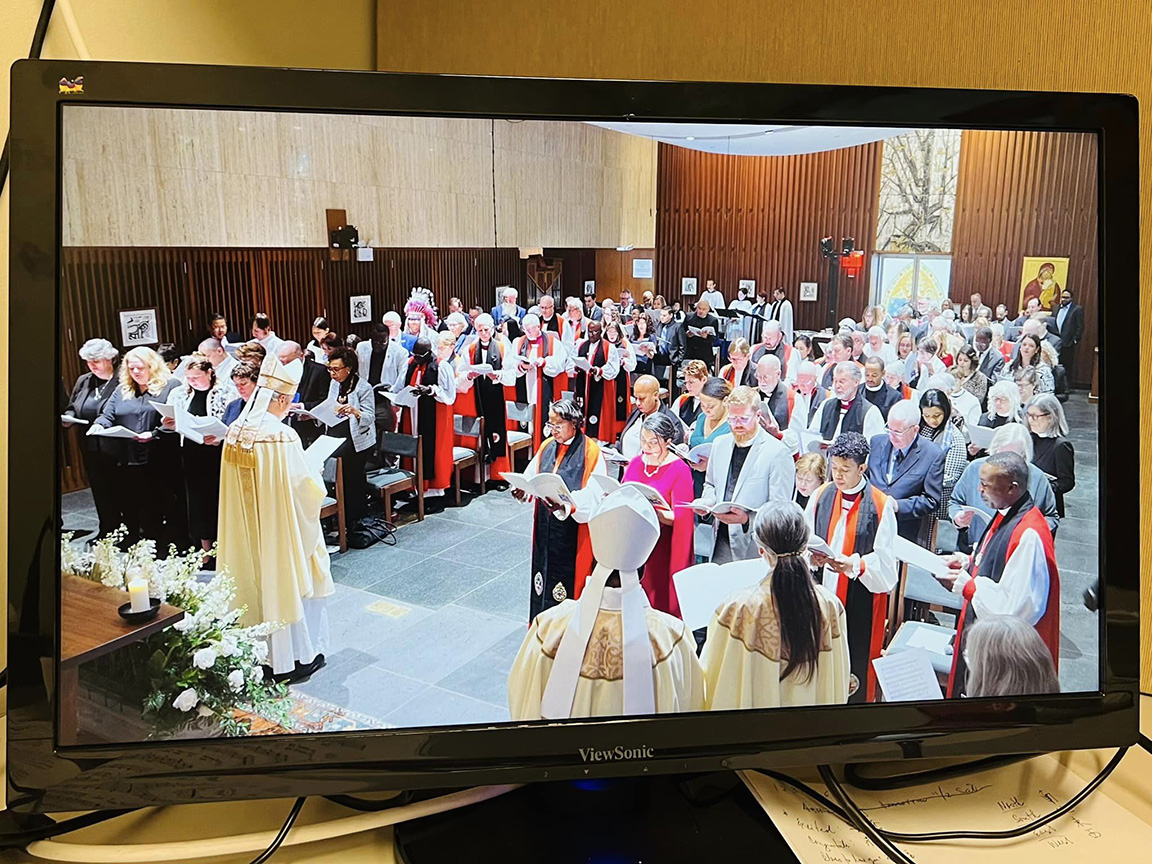
The investiture of new Presiding Bishop Sean Rowe was held in the chapel of Christ the Savior at the Episcopal Church Center in New York. Katherine Feng of the Diocese of Los Angeles caught this screenshot on her monitor as she translated the service into Mandarin for in-person and online viewers.
[The Episcopal News] The intimate but widely viewed investiture of the Most Rev. Sean Rowe as the 28th Presiding Bishop of The Episcopal Church sent a message of hope and of “singing a new song” to God in a changing world and church, according to the Rev. Lester Mackenzie and others from the Diocese of Los Angeles who attended the Nov. 2 ceremony.
“For me, the whole point was holy joy,” said Mackenzie, who until recently served as rector of St. Mary’s Church in Laguna Beach. Rowe announced in a Nov. 4 letter Mackenzie’s appointment as chief of mission program for The Episcopal Church.
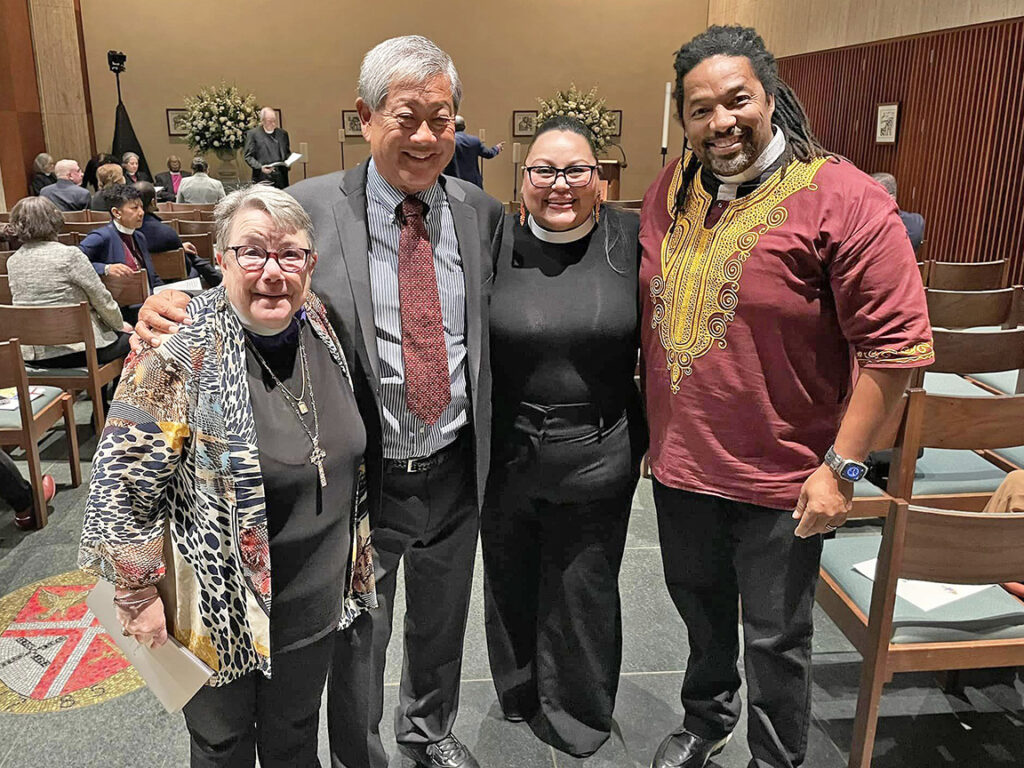
Diocese of Los Angeles-connected people attending and participating in the investiture are, from left, Bishop Diane Jardine Bruce, former bishop suffragan in L.A., now provisional bishop of West Missouri; Canon Steven Nishibayashi, L.A. secretary of convention and co-chair of the PB nominating committee; Nancy Frausto, ordained in the Diocese of Los Angeles and now director of Latinx Studies at Seminary of the Southwest; and Lester Mackenzie, recently resigned rector of St. Mary’s Church, Laguna Beach, and newly named chief of mission program on the new presiding bishop’s staff. Photo: Courtesy of Diane Jardine Bruce
“The music was a journey around our whole Episcopal Church,” said Mackenzie, who offered prayers in Xhosa, and accompanied a quartet of singers with the djembe, an African drum. “There were some South African songs that are well-known and other songs from the rest of our Anglican communion, a mix that represented the diverse tapestry of our Episcopal Church.”
There were “also some old favorites, hymns you don’t need a hymnal to sing, the ones that are in your bones,” said Mackenzie, singing briefly, “’For All the Saints, who from their labors rest’ … you don’t need a hymnal for that!” He added, laughingly, that the ceremony also offered him “an excuse to pull out the drum.”
The Rev. Katherine Feng said she was excited to attend her first such ceremony and also to visit the church headquarters for the first time. She served as translator for Mandarin speakers, working among others who translated the service into Spanish, Portuguese and sign language.
“The first person I met in the lobby of the church center was the presiding bishop-elect,” Feng told The News during a recent telephone interview. “I could not believe it. I got a chance to congratulate him before the big day. I asked him if he had been on retreat. He said there was not a particular period of time for retreat but that he did have some quiet time to prepare himself.”
She added: “It was such an honor for me to be there at this important moment of the church. It means our church is open and diverse. I just feel so grateful and so proud and so hopeful for our church.”
Rowe’s sermon, focused on the lectionary readings for Sunday, and specifically the raising of Lazarus in John’s gospel, sent a message to the church, Feng said.
“The gospel was Jesus calling Lazarus out of the tomb, bringing him from death to resurrection. He (Rowe) said we are facing death, but we still have access to resurrection, to life, because Jesus is there and he is the word, the life. After he called Lazarus out of the tomb, he told the people to go and unbind him. I had tears at that time, because that’s us.
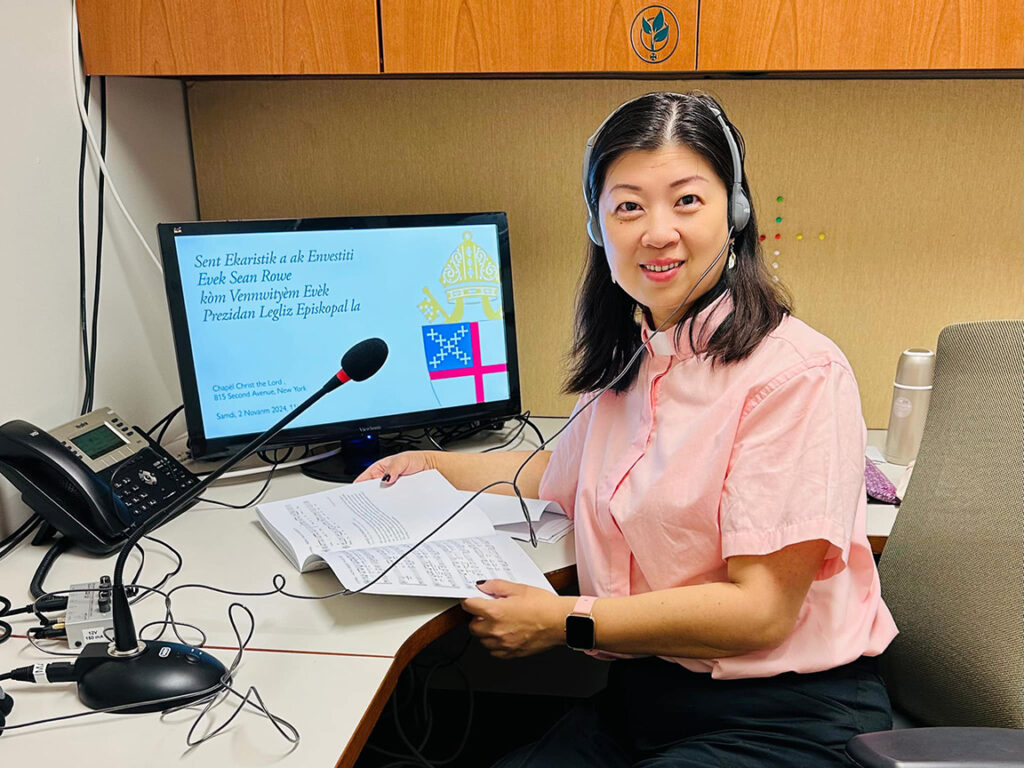
Katherine Feng of the Diocese of Los Angeles translates the investiture service into Mandarin. Photo: Courtesy of Katherine Feng
“We get to be a part of his ministry; we get to be part of this amazing work that he does in the world,” she said, tearfully. “I am really looking forward to his leadership for the next nine years, and to see what our church can do.”
“He said most of us are feeling like those people surrounding the tomb. We feel lost, are fearful and don’t know what to do, but we need to remember that Jesus is there with us and turning dead things to life and calling us to be part of it.”
She also had an opportunity to hug outgoing Presiding Bishop Michael Curry, “because what he has done for our church has meant a lot to me personally and the community I stand for, the immigrant community, and people of color in our church. He has been an evangelist, and his love definitely touched so many of our hearts.”
Greeting former Presiding Bishop Katharine Jefferts Schori also meant a great deal. “I always admire and am grateful to her for being our first female presiding bishop,” Feng said. “I’m a female clergy person and a female Christian and that means a lot. It means a lot, being a member of The Episcopal Church and being a disciple of Christ and following these amazing leaders on my journey has inspired me in every possible way.”
Secretary of Convention Steve Nishibayashi, who co-chaired the Joint Nominating Committee for the Election of the Presiding Bishop, said he was surprised to be invited to the scaled-down event but relished the opportunity to meet in person some folks he had only known through Zoom meetings.
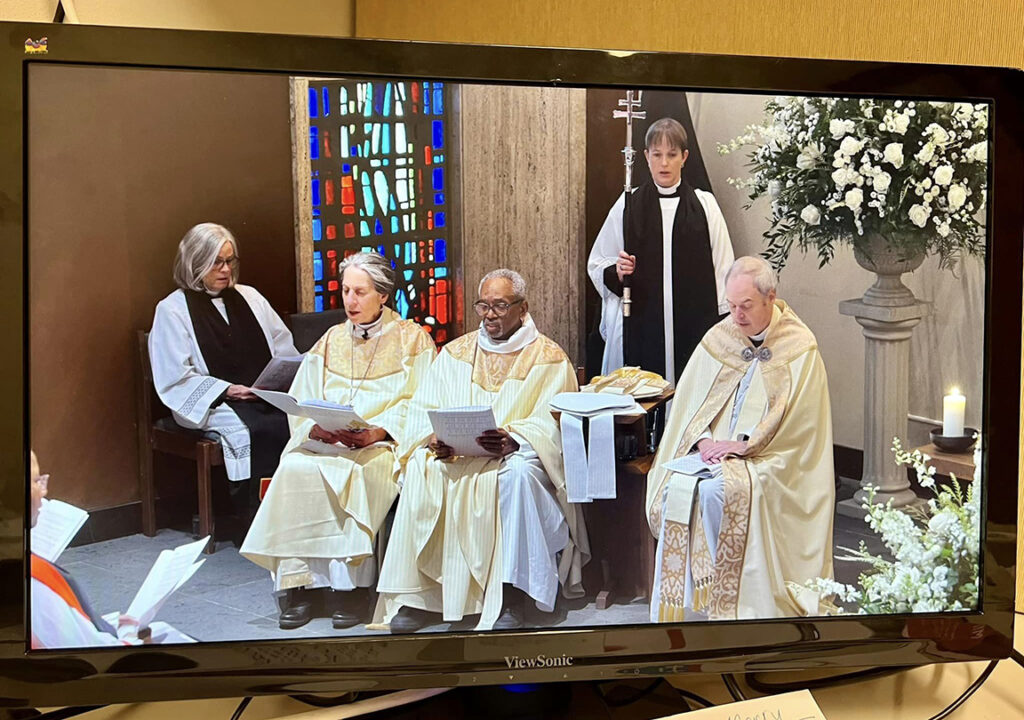
Former presiding bishops Katharine Jefferts Schori and Michael Curry participated in the service of investiture for their sucessor, Sean Rowe. Screenshot courtesy of Katherine Feng
Nishibayashi said Rowe’s June 26, 2024, election on the first ballot at the 81st General Convention in Louisville, Kentucky, “seemed to be a mandate. The optimism, not just from me as an individual, but the mandate that the church has said, ‘this is the presiding bishop for this time and going forward’, was clearly reflected in Rowe’s concise sermon.
“My takeaway was that things will change, and we are hopeful they will change for the better and we anticipate and expect they will be. Let’s move forward and not look back.”
As co-chair of the nominating committee, “It was clear to me our job was not to find a successor to Michael Curry – there is only one Michael Curry – but to find a presiding bishop for the time going forward.
“And it was clearly reflected in his sermon that there is a future and we’re going to meet it head on. And if we don’t, then that’s on us.”
The Rev. Anthony Guillen, Episcopal Church missioner for Latino Ministry, based in the L.A. diocese, also was impressed by Rowe’s sermon. “It was short; it was succinct, and he told us a lot about himself through that sermon,” he said.
“He was calling for a different way of doing things and he modeled that, including awareness of the carbon footprint.”
Celebrating at the chapel instead of Washington National Cathedral invited the church into its inner workings in a new way, added Guillen, who viewed the ceremony at a staff watch party.
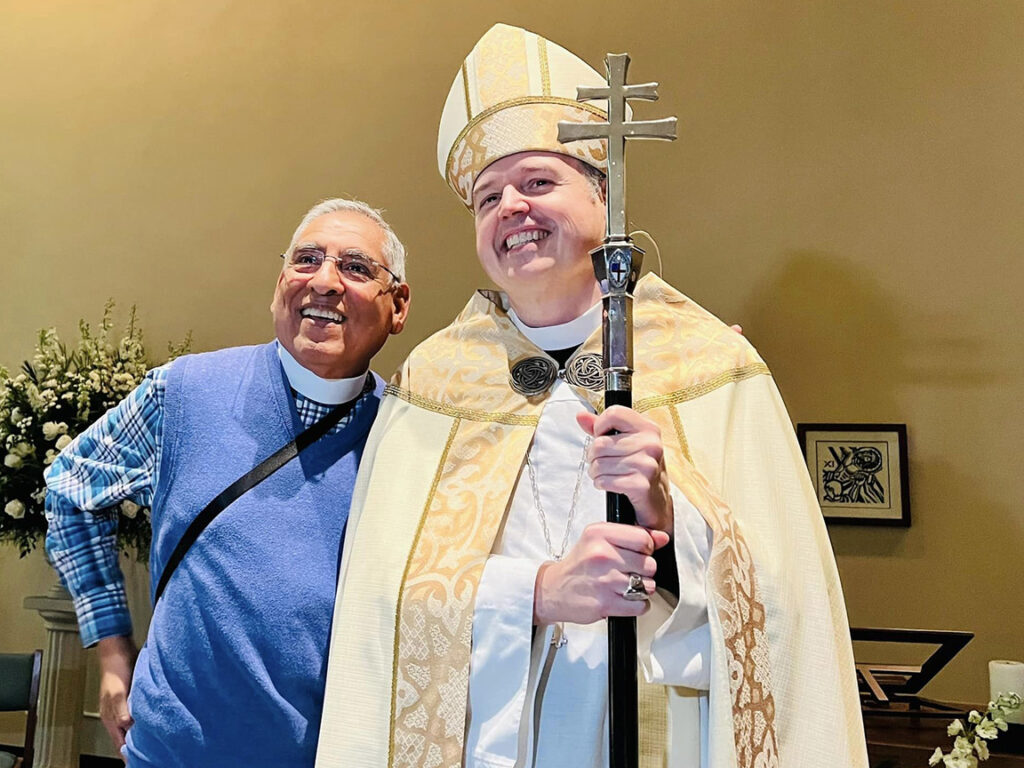
Anthony Guillen, priest of the Diocese of Los Angeles and Episcopal Church missioner for Latino Ministry, shares a light moment with new Presiding Bishop Sean Rowe. Photo: Courtesy of Katherine Feng
Tens of thousands of people across the church gathered to view the ceremony virtually, including in Los Angeles, where about 43 members of the Daughters of the King began their annual fall assembly with an early morning watch party at Christ the Good Shepherd Church.
“I thought it would be larger, grander, more pomp and circumstance, and I was pleasantly surprised to see it smaller, more intimate and almost more meaningful,” said Amy Givan, diocesan DOK treasurer.
The diversity of the ceremony was also impressive, including intercessions offered in Eastern Shoshone, Mandarin, Juba, German, Arabic, Hebrew, French, Anishinaabemowin (an Ojibwan language), Spanish, Xhosa, French, and English.
“The multilingual prayers gave me hope for inclusion and acceptance,” Givan said. A part of the day’s activities was an artistic project incorporating prayers to be sent to Rowe, she said, “as a ‘the DOK in L.A. welcomes you.’”
